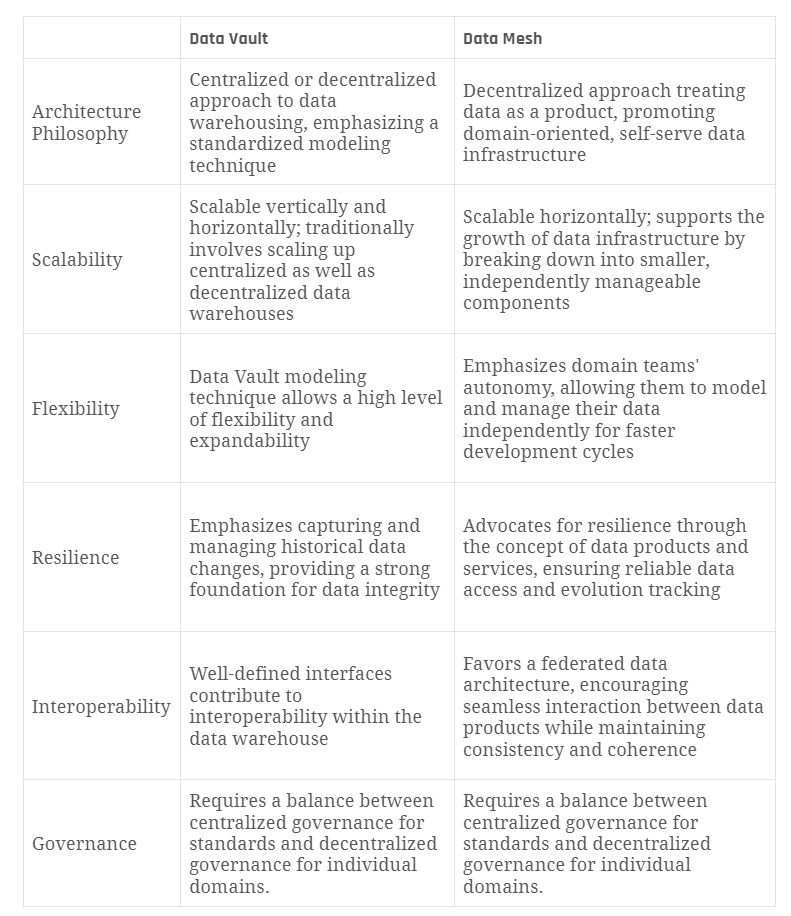Data Vault & Data Mesh
Dive into the integration of Data Vault within the context of Data Mesh, the journey into the future of scalable and decentralized data architectures with our Data Vault 2.Go Newsletter, your go-to source for (almost) all things related to the cutting-edge world of data.
In this edition, we’re diving into the integration of Data Vault 2.0 within the context of a Data Mesh approach. Join the journey into the future of scalable and decentralized data architectures.
Data Vault in a Data Mesh approach
This webniar explores the integration of Data Vault within a Data Mesh approach, highlighting the synergy between Data Mesh principles and Data Vault’s scalability, flexibility, resilience, and interoperability. We’re diving into the integration of Data Vault within the context of a Data Mesh approach. A journey into the future of scalable and decentralized data architectures.
Understanding Data Mesh: a quick recap
Before we delve into the role of Data Vault, let’s refresh our memories on what a Data Mesh is. Coined by Zhamak Dehghani, a Data Mesh is an architectural paradigm that aims to address the challenges of scaling data within large organizations. It promotes a decentralized approach to data ownership and access, treating data as a product and establishing domain-oriented, self-serve data infrastructure.
Data Vault in the Mesh: a synergistic alliance
Now, let’s talk about Data Vault. Historically recognized as a robust methodology for building enterprise data warehouses, Data Vault has proven its worth in creating scalable, flexible, and resilient data architectures. However, its integration into a Data Mesh approach adds a new layer of agility and efficiency.
Scalability
Data Mesh emphasizes the need for decentralized data ownership, making it crucial to scale data infrastructure horizontally. Data Vault, with its modular and scalable architecture, aligns seamlessly with this requirement. By breaking down the data warehouse into smaller, manageable components, Data Vault ensures that the system can scale effortlessly as data volume and complexity increase.
Flexibility
In a Data Mesh, each domain or business unit is responsible for its own data products. Data Vault’s adaptability shines here, allowing different teams to model and manage their data independently. This flexibility enables faster development cycles and reduces dependencies on a centralized data team, empowering domain teams to innovate and iterate at their own pace.
Resilience
Data Mesh introduces the concept of data products and services, emphasizing the need for resilience in data architectures. Data Vault, with its focus on capturing and managing historical data changes, plays a crucial role in ensuring the reliability and integrity of data products. This historical record-keeping proves invaluable for auditing, compliance, and understanding the evolution of data over time.
Interoperability
A Data Mesh advocates for a federated data architecture where data products can seamlessly interact with each other. Data Vault’s standardized modeling techniques and well-defined interfaces make it easier for different domains to collaborate and share data while maintaining consistency and coherence across the entire ecosystem.

Conclusion
The marriage of Data Vault and Data Mesh represents a leap forward in the evolution of data architectures. It combines the proven reliability of Data Vault with the agility and scalability of a decentralized Data Mesh, offering organizations a powerful solution for managing their ever-growing and diverse data landscape.
While the integration of Data Vault into a Data Mesh approach brings numerous benefits, it’s essential to acknowledge potential challenges. Managing the decentralized nature of data ownership, ensuring consistent standards across domains, and providing adequate governance are crucial aspects that require careful consideration.
Make sure to watch the webinar recording to Data Mesh in a Data Vault 2.0 approach to dive even deeper into the knowledge.
– Marc Winkelmann (Scalefree)
